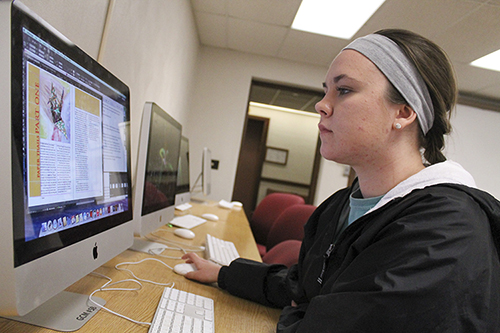
Taylor Thomas, senior from Eddyville, Ky., builds a graphic as a public relations major.
Getting involved on campus, especially within a student’s major, gives them the most bang for their buck.
David Balthrop, chair of the department of theatre, said it’s practical for students to get involved.
“Students should be involved because they’re paying a lot of money to have the experience,” Balthrop said.
He said students who join organizations on campus also have a leg-up in the job hunt as a post-graduate. Those students have more to put on a resume and probably have more experience, he said.
“(Businesses) want to hire students who have practical work experience in their major,” Balthrop said. “Employers don’t want to hire students who know where their classrooms and the library are located on campus.”
It’s easy to forget to be involved, said Nikole Faudel-Rickard, junior from Southern Pines, N.C., who switched majors from agriculture to zoological conservation two semesters ago.
Rickard said labs and classes keep her too busy to get seriously involved in her major, especially so late in the game.
“You become more focused on classes and finishing school and less on the social aspects,” Rickard said.
However, Balthrop said that’s a bad mindset to fall into.
He said one of the biggest mistakes students make is waiting to get involved at the last minute, when graduation looms.
The other is thinking faculty members don’t know what they’re talking about.
“Rarely does the student understand the business environment and have their fingers on the pulse of the industry as much as the faculty,” Balthrop said.
Reika Ebert, chair of the department of modern languages, said another big mistake is not putting in full effort and not having peer support.
“The biggest mistake students make is merely doing minimal work in class and working just individually without peers,” Ebert said.
Getting involved isn’t just about having resume builders – it also puts opportunities in front of students, she said. Organizations help build connections with others in the field and with potential employers.
Paula Vick, junior from Brighton, Tenn., is involved in her major, agriculture business. She left high school already a member of FFA and switched smoothly into Collegiate FFA without a hiccup, and has also joined several other agriculture organizations.
“It just made sense to join,” she said. “It’s important to get an education, not a degree. What you know is who you know.”
Agriculture does not require students to join organizations, but some, like the theater department, do. Students join through their own initiative and Ebert said students majoring in modern languages seem to have that initiative.
“(Involvement) depends on the student, but generally I would say yes, (they are) very much so,” she said.
Vick said the organizations she joined her freshman year helped her learn new skills and meet people within her field.
Balthrop said early involvement is key for students wanting to get the most out of their time.
“Forcing involvement in at the last minute minimizes the total effect of that involvement,” Balthrop said.
Story by Amanda Grau, Assistant News Editor